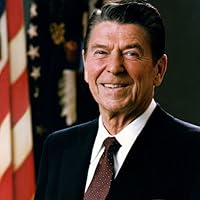Reagan Quotes
Quotes tagged as "reagan"
Showing 1-30 of 50

“Socialists ignore the side of man that is the spirit. They can provide you shelter, fill your belly with bacon and beans, treat you when you're ill, all the things guaranteed to a prisoner or a slave. They don't understand that we also dream.”
―
―

“I didn't want to like him back. I tried to be mean to him."
"I thought you were just mean," Reagan said. "I liked that about you.”
― Fangirl
"I thought you were just mean," Reagan said. "I liked that about you.”
― Fangirl

“More than a decade ago, a Supreme Court decision literally wiped off the books of fifty states statutes protecting the rights of unborn children. Abortion on demand now takes the lives of up to 1.5 million unborn children a year. Human life legislation ending this tragedy will some day pass the Congress, and you and I must never rest until it does. Unless and until it can be proven that the unborn child is not a living entity, then its right to life, liberty, and the pursuit of happiness must be protected.”
―
―

“Government is like a baby: an alimentary canal with a big appetite at one end and no sense of responsibility at the other.”
―
―

“Prepare yourself for some bad news: Ronald Reagan’s library just burned down. Both books were destroyed. But the real horror: He hadn’t finished coloring either one of them.”
―
―

“And if Henry Higgins is not the most reprehensible character ever written for the stage, that's only because somewhere, somehow, someone is composing a musical biography of Ronald Reagan”
― My Most Excellent Year
― My Most Excellent Year

“Sugar maple!" Mary-Todd Holt knelt over her husband. "Are you all right?"
Eisenhower sat up, and egg-size lump blooming on his crown. "Of course I'm all right!" he managed, his words slurred. "You think a little insect can stop me?"
Reagan was unconvinced. "I don't know, Dad. She brained you with a baseball bat!"
"Hockey stick," Dan corrected.
"Those could be your last words, brat–”
― One False Note
Eisenhower sat up, and egg-size lump blooming on his crown. "Of course I'm all right!" he managed, his words slurred. "You think a little insect can stop me?"
Reagan was unconvinced. "I don't know, Dad. She brained you with a baseball bat!"
"Hockey stick," Dan corrected.
"Those could be your last words, brat–”
― One False Note

“The Army's new pitch was simple. Good pay, good benefits, a manageable amount of adventure... but don't worry, we're not looking to pick fights these days. For a country that had paid so dear a price for its recent military buccaneering, the message was comforting. We still had the largest and most technologically advanced standing army in the world, the most nuclear weapons, the best and most powerful conventional weapons systems, the biggest navy. At the same time, to the average recruit the promise wasn't some imminent and dangerous combat deployment; it was 288 bucks a month (every month), training, travel, and experience. Selling the post-Vietnam military as a career choice meant selling the idea of peacetime service. It meant selling the idea of peacetime. Barf.”
― Drift
― Drift

“Cath exhaled. Then inhaled. Her chest was so tight, it hurt both ways. Levi shouldn't get to make her feel this way - he shouldn't even have access to her chest.”
―
―

“If freedom, democracy, and the rights of man are to be preserved through the ages, free men and women must accept the responsibilities that go with their freedoms.”
―
―

“Yes, our country has its shortcomings, but there's no moral equivalency between democracy and totalitarianism…There's no moral equivalency between propaganda and the truth.”
―
―

“President Reagan officially announced his administration's War on Drugs. At the time...less than 2 percent of the American public viewed drugs as the most important issue facing the nation. This fact was no deterrent to Reagan, for the drug war from the outset had little to do with public concern about drugs and much to do with public concern about race.”
― The New Jim Crow: Mass Incarceration in the Age of Colorblindness
― The New Jim Crow: Mass Incarceration in the Age of Colorblindness

“Why did you come back for me? You could have died, Hendrix. He could have killed you."
He squeezed me against him until it was almost painful. I loved it.
"I will always come back for you, Reagan. Nothing will stop me from getting to you.”
― Love and Decay 3, Episode Two
He squeezed me against him until it was almost painful. I loved it.
"I will always come back for you, Reagan. Nothing will stop me from getting to you.”
― Love and Decay 3, Episode Two

“Reagan's promise to enhance the federal government's role in fighting crime was complicated by the fact that fighting street crime has traditionally been the responsibility of state and local law enforcement. After a period of initial confusion and controversy...the Justice Department announced its intention to cut in half the number of specialists assigned to identify and prosecute white collar criminals and to shift its attention to street crime, especially drug-law enforcement.”
― The New Jim Crow: Mass Incarceration in the Age of Colorblindness
― The New Jim Crow: Mass Incarceration in the Age of Colorblindness

“The human consequences of Reagan's budget cuts went deep. For instance, Social Security disability benefits were terminated for 350,000 people. A war hero of Vietnam, Roy Benavidez, who had been presented with the Congressional Medal Of Honor by Reagan, 'Was told by Social Security officials that the shrapnel pieces in his heart, arms, and leg did not prevent him from working. Appearing before a congressional committee, he denounced Reagan.”
― A People's History Of The United States Sm
― A People's History Of The United States Sm

“You know something, Stu?' Reagan said to Stuart Spencer. 'Politics is just like show business... You begin with a hell of an opening, you coast for a while, & you end with a hell of a closing.”
― These Truths: A History of the United States
― These Truths: A History of the United States

“People do not make wars; governments do. And no mother would ever willingly sacrifice her sons for territorial gain, for economic advantage, for ideology. A people free to choose will always choose peace. Americans seek always to make friends of old antagonists. After a colonial revolution with Britain, we have cemented for all ages the ties of kinship between our nations... We fought two world wars in my lifetime against Germany and one with Japan, but now the Federal Republic of Germany and Japan are two of our closest allies and friends.”
―
―

“Plus, there's me to worry about," he continued, as if I hadn't said anything.
"You'd be heartbroken?" I laughed, not believing him for a second.
"Not yet," he took a step closer and played with a loose end of my hair that curled around my shoulder. "But I'm working on it.”
― Love and Decay, Episode Two
"You'd be heartbroken?" I laughed, not believing him for a second.
"Not yet," he took a step closer and played with a loose end of my hair that curled around my shoulder. "But I'm working on it.”
― Love and Decay, Episode Two

“When do you think they're going to learn, Reagan? It's not you they should be afraid of. It's me.”
― Love and Decay 3, Episode Seven
― Love and Decay 3, Episode Seven
“It also seriously undercuts the Reagan myth by showing that when it came to governing, it was the president's often practical side that ruled the day, and that it was this, not his radical conservative instincts, that had the lasting positive impact.”
― Tear Down This Myth: How the Reagan Legacy Has Distorted Our Politics and Haunts Our Future
― Tear Down This Myth: How the Reagan Legacy Has Distorted Our Politics and Haunts Our Future

“The equilibrium of the system is always in crisis, but this produces no serious consequences. The needle merely oscillates around a hypothetical centre, a statistical median. The oscillations no longer lead to the system being overturned, since it no longer has a centre of gravity. The 1929 crisis could not recur today. It has been replaced by a perpetual crisis simulation. In the same way, it is possible for the heroic or intrinsic values of a society to collapse, whereas the same values in renovated, simulated, face-lifted form (take Reagan, for example) no longer run the risk of ending in catastrophe. They are no longer in danger of having their weight plunge them to a sticky end. They either float or, like currencies, follow the writhing course of the snake. We do the same in our own lives: with a float on each side, we go forward oscillating around a hypothetical equilibrium path, keeping our distance from the fatal declinations.”
― Cool Memories
― Cool Memories

“Loss in Vietnam radicalized a generation of veterans, pushing many into the ranks of white-supremacist groups. Ronald Reagan, as the standard bearer of an ascendant New Right, effectively tapped into this radicalization, which helped lift him to victory in his 1980 presidential campaign. Once he was in office, Reagan's re-escalation of the Cold War allowed him to contain the radicalization, preventing it from spilling over (too much) into domestic politics. Anti-communist campaigns in Central America—a region Reagan called "our southern frontier"—were especially helpful in focusing militancy outward. But Reagan's Central American wars (which comprised support for the Contras in Nicaragua and death squads in El Salvador, Guatemala, and Honduras) generated millions of refugees, many, perhaps most, of whom fled to the United States. As they came over the border, they inflamed the same constituencies that Reagan had mobilized to wage the wars that had turned them into refugees in the first place.”
― The End of the Myth: From the Frontier to the Border Wall in the Mind of America
― The End of the Myth: From the Frontier to the Border Wall in the Mind of America

“The Reagan Revolution was just that: a radical revolution for the benefit of the already powerful.”
― How to Be an Antiracist
― How to Be an Antiracist

“The profit-first, profit-only view of business under the Reagan Revolution raised new concerns about the social obligations of corporations beyond shareholders to constituencies like employees, creditors, customers, and local communities. This was motivated in part by the fact that despite significant stock market increases and income growth for the wealthy, many working-class Americans were left behind in the economic growth.”
― The Capitalist and the Activist: Corporate Social Activism and the New Business of Change
― The Capitalist and the Activist: Corporate Social Activism and the New Business of Change
“A self important college freshman was walking along the beach philosophizing to anyone who would listen, when he came across an old man minding his own business in the shade.
He made it clear to the old man that it was impossible for the old man's generation to understand the new regime. The new generation, the young Turks.
You grew up in a different world, the student said, and a pretty primitive one. The youth of today grew up with television, jet speed travel, space travel, man walked on the moon. We have nuclear energy, super tankers, and smartphones, broadband internet systems, and so much more.
The old man thought for a second, and then responded, you're right son, we didn't have those things when we were young, that's why we invented them, for arrogant little shits like you. What have you got planned for the next generation?”
― Zen Jiu Jitsu: The 30 Day Program to improve Your Game 1000%
He made it clear to the old man that it was impossible for the old man's generation to understand the new regime. The new generation, the young Turks.
You grew up in a different world, the student said, and a pretty primitive one. The youth of today grew up with television, jet speed travel, space travel, man walked on the moon. We have nuclear energy, super tankers, and smartphones, broadband internet systems, and so much more.
The old man thought for a second, and then responded, you're right son, we didn't have those things when we were young, that's why we invented them, for arrogant little shits like you. What have you got planned for the next generation?”
― Zen Jiu Jitsu: The 30 Day Program to improve Your Game 1000%
All Quotes
|
My Quotes
|
Add A Quote
Browse By Tag
- Love Quotes 97k
- Life Quotes 75.5k
- Inspirational Quotes 72.5k
- Humor Quotes 43.5k
- Philosophy Quotes 29.5k
- Inspirational Quotes Quotes 27k
- God Quotes 26k
- Truth Quotes 23.5k
- Wisdom Quotes 23.5k
- Romance Quotes 23k
- Poetry Quotes 22k
- Death Quotes 20k
- Happiness Quotes 18.5k
- Life Lessons Quotes 18.5k
- Hope Quotes 18k
- Faith Quotes 18k
- Quotes Quotes 16.5k
- Inspiration Quotes 16.5k
- Spirituality Quotes 15k
- Religion Quotes 15k
- Motivational Quotes 15k
- Writing Quotes 14.5k
- Relationships Quotes 14.5k
- Life Quotes Quotes 14k
- Love Quotes Quotes 13.5k
- Success Quotes 13.5k
- Time Quotes 12.5k
- Motivation Quotes 12k
- Science Quotes 11.5k
- Knowledge Quotes 11k



